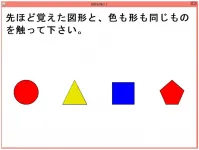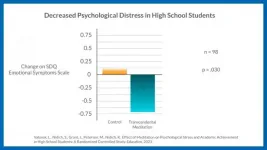(Press-News.org) Kanazawa, Japan - As the global population ages, the rate of dementia is increasing worldwide. Given that early detection is critical for treatment, effective ways to screen for dementia are a high research priority. Now, researchers from Japan have developed a new screening tool that can be administered in a matter of minutes.
In a study published in PLOS ONE, researchers from Kanazawa University have revealed a new computerized cognitive test, termed the computerized assessment battery for cognition (C-ABC), which they found to be effective in screening for both dementia and mild cognitive impairment (MCI) in just 5 minutes.
Computerized cognitive tests are frequently chosen over paper-and-pencil versions because they are more precise and do not require training to administer. However, computerized cognitive tests for dementia and MCI generally take 10-30 minutes to complete. Further, the wide range of existing tests can make it difficult for healthcare practitioners to choose one that is suitable for detecting dementia or MCI. The researchers at Kanazawa University aimed to address this by creating a test that could be used to accurately and efficiently screen for both conditions.
"Although patients with dementia usually have disorientation and severe memory disturbance, those with MCI and those with normal cognition rarely have both," says co-lead author of the study Moeko Noguchi-Shinohara. "We wanted to develop a test that could distinguish these cognitive states in an efficient manner."
To do this, the researchers collected C-ABC scores from participants in different age groups (50s, 60s, and those aged 70-85 years) with dementia, MCI, and normal cognition. They then conducted a range of statistical tests to determine whether the test could distinguish normal cognition, dementia, and MCI.
"The results were surprising," explains Masahito Yamada, senior author. "We found that the C-ABC could distinguish individuals with MCI from those with normal cognition using scores from items that only took 5 minutes to complete."
In fact, in the 75-80 age group, answers from just two questions could distinguish participants with MCI from those with normal cognition, and these two items took just 2 minutes to complete.
"When we compared our C-ABS scores with those from the frequently used Mini-Mental State Examination (MMSE), we found a high correlation. However, the C-ABC is substantially faster to complete than the MMSE, and may be more sensitive to MCI or mild dementia," says Yamada.
The data indicate that when used with a high cut-off score for sensitivity, the C-ABC is appropriate for initial screening for dementia and MCI. This new tool could make cognitive screening more accessible and efficient, thus enabling earlier detection of MCI or dementia. This, in turn, could improve the treatment options and overall outcome for individuals with MCI or dementia.
INFORMATION:
Tsukuba, Japan - Heavy snowfall slows things down and makes it harder to get from point A to point B. But snow clouds have a silver lining--heavy snow may prevent serious road injuries and even save lives. How? By getting people off bicycles and switching to safer modes of transport.
Japanese researchers examined 10 years of police data on road injuries among commuting junior high school students. They found that areas with monthly snowfall of at least 100 cm had almost no bicycling-related injuries. Total injuries among cyclists and pedestrians also fell by 68%. The findings were published in the Journal of Epidemiology.
The logic is quite simple. ...
A new data-driven study from Texas A&M University casts serious doubt on the stereotype that male students perform better than female students in science -- specifically, physics.
A team of researchers in the Department of Physics and Astronomy analyzed both the midterm exam scores and final grades of more than 10,000 Texas A&M students enrolled in four introductory physics courses across more than a decade, finding no evidence that male students consistently outperform female students in these courses.
The work was led by Texas A&M physicist ...
Teachers who participated in a meditation-based teacher development program utilizing the Transcendental Meditation (TM) technique for four months, had significant improvements in emotional exhaustion (the leading factor in burnout), resilience, perceived stress, fatigue, and depression according to a new randomized controlled trial published today in Frontiers in Education.
"Teachers are under high levels of stress as they are asked every day to support their students' learning amidst numerous challenges," said Laurent Valosek, lead author of the study and executive director of the Center for Wellness and Achievement in Education. "This study demonstrates the benefits ...
Exercise has long-been recommended as a cognitive-behavioral therapy for patients of depression, yet new evidence from the University of California of San Diego suggests that the COVID-19 pandemic changed the nature of the relationship between physical activity and mental health.
In a study of college students conducted before and during the pandemic, findings revealed the average steps of subjects declined from 10,000 to 4,600 steps per day and rates of depression increased from 32% to 61%.
The research, recently published in the Proceedings of the National Academy of Sciences, also revealed short-term restoration of exercise does not meaningfully ...
During the first half of 2020, the U.S. Intermountain West region of the United States experienced four significant earthquake sequences, spanning multiple states. In the new issue of SRL, 15 papers characterize these major earthquakes and discuss how they are helping seismologists gain new insights into the tectonics of the region.
The Intermountain West is bounded by the eastern margin of the Sierra Nevada and Cascade Mountains to the west and the Rocky Mountains to the east. While its earthquake risk is often overlooked in comparison to those in California and the Pacific Northwest, the region ...
The COVID-19 pandemic has had a profound effect across society, but it has been especially devastating for people with substance use disorder.
A new study, published in the journal PLOS ONE, sheds light on the experience of patients with substance use disorder who were hospitalized during the initial surge of COVID-19 cases in Oregon last spring. Researchers with Oregon Health & Science University conclude that health systems nationwide could benefit from a better understanding of people who struggle with the basics.
"We need the system to be designed and implemented for patients who may lack phone access, who may not have access to WiFi or may be living on the streets," said lead ...
A combined treatment of irradiation and essential oil vapors could effectively destroy insects, bacteria and mold in stored grains. A team from the END ...
Being able to make blind people see again sounds like the stuff of miracles or even science fiction. And it has always been one of the biggest challenges for scientists. Diego Ghezzi, who holds the Medtronic Chair in Neuroengineering (LNE) at EPFL's School of Engineering, has made this issue a research focus. Since 2015, he and his team have been developing a retinal implant that works with camera-equipped smart glasses and a microcomputer. "Our system is designed to give blind people a form of artificial vision by using electrodes to stimulate their retinal cells," says Ghezzi.
Read more: https://actu.epfl.ch/news/a-retinal-implant-that-is-more-effective-against-b/
Star-spangled sky
The camera embedded in the smart glasses captures images in the wearer's field of vision, and ...
In order to stay alive, the cell must provide its various organelles with all the energy elements they need, which are formed in the Golgi apparatus, its centre of maturation and redistribution of lipids and proteins. But how do the proteins that carry these cargoes - the kinesins - find their way and direction within the cell's "road network" to deliver them at the right place? Chemists and biochemists at the University of Geneva (UNIGE), Switzerland, have discovered a fluorescent chemical dye, making it possible for the first time to track the transport ...
More Antarctic meltwater is surfacing than was previously known, modifying the climate, preventing sea ice from forming and boosting marine productivity- according to new research from the University of East Anglia (UEA).
For the first time, researchers have been able to obtain full-depth glacial meltwater observations in winter, using instruments attached to the heads of seals living near the Pine Island Glacier, in the remote Amundsen Sea in the west of Antarctica.
The harsh environmental conditions in the Antarctic limit the use of most traditional observation systems, such as ships and airplanes, especially ...




